Multiple opinions on the name Pathological Demand Avoidance
Both Emily Wilding and Sally Cat of Free PDA have written on, and collated opinions on, the name for our neurotype, known as Pathological Demand Avoidance or PDA for short. Below you will find Sally Cat's article, containing ideas from a number of PDAers, including Emily. Then below, an article written by Emily to add some thoughts. Right at the bottom, we have added a few links to other articles we have produced that may be helpful. From Sally Cat: "Pathological demand avoidance" (PDA) is the name of a life-long neurological condition. The term was coined by Professor Elizabeth Newson, who first identified the condition in the 1980s. In addition to the trait of pathological demand avoidance, PDA entails: High anxiety, control-need, use of social strategies, sociability, mood swings, comfort in fantasy & role-play and obsessive, often people-focused behaviour ( link ). And also: Disregard for social hierarchy, masking, love of novelty, dislike...




